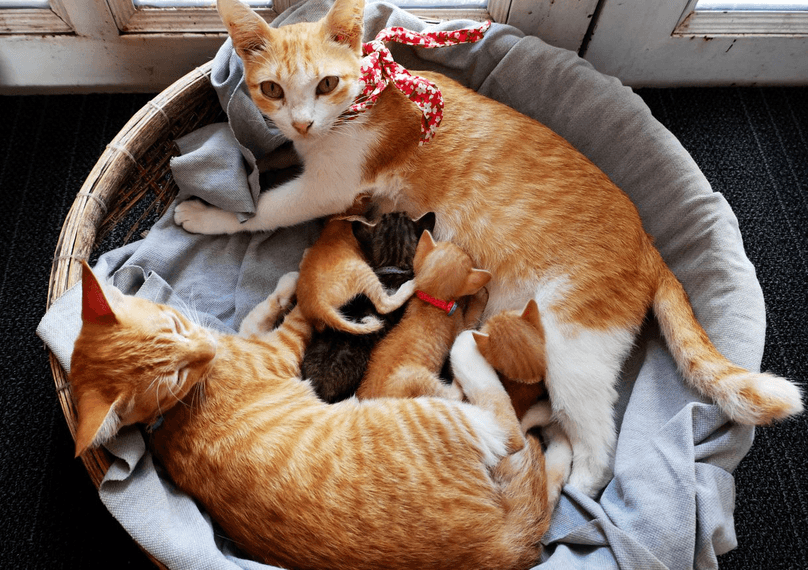
If you are welcoming a litter of newborn kittens into your home, you might feel elated—but also a little overwhelmed. After all, taking care of a mother cat and her kittens comes with a great deal of responsibility. Ultimately, however, the reward and additional family members, are well worth it. If you are ready to become an excellent pet parent, follow along for a few helpful tips on how to take care of a mother cat and her kittens at home.
Tips for Caring for Newborn Kittens and Their Mother
Newborn kittens are delicate and require special care—especially during their first few weeks of life. This period is critical for their proper development and well-being, so knowing what to expect is essential. Ideally, before the birth of her kittens, the mother cat should be current on her vaccinations. This preventive care will help prevent the transmission of diseases like feline herpesvirus (FHV) and feline calicivirus to her kittens.
If your cat is expecting, be sure to schedule an initial consultation with your veterinarian to ensure the mother’s health, determine the best vaccination schedule, and to mitigate any potential complications.
Caring for Newborn Kittens During the First Week
The first week of a kitten’s life is critical. During the first week, kittens are entirely dependent on their mother for survival. The majority of their time is spent sleeping and nursing, and their eyes and ears will be closed. They won’t be able to regulate their body temperature, so it will be important to provide them with a warm and safe environment. You will want to create a cozy and comfortable space for the newborn kittens and their mother to rest and eat.
Consider using a cardboard box, pet carrier or a nesting bed to provide a cozy place for the mother and kittens to rest. Make sure to change their bedding and litter box frequently, and keep the area clean to prevent the likelihood of infection. Ensure the mother has plenty of access to food and water, so she is well prepared to nurture her little ones. Keeping these suggestions in mind will ensure the safety and comfort of the mother and kittens during their very first days of life.
Navigating the Second Week of Life
By the second week, the kittens’ eyes and ears will start to open and they will begin to crawl and explore their surroundings. While they will still be nursing frequently, they will not yet be able to regulate their body temperature, so continue to provide a warm environment for them. At this point, you can consider using a heating pad or heat lamp to provide a consistent source of warmth.
If you notice your mother cat hasn’t been caring for her kittens, this is abnormal behavior and it will be important to intervene. You may need to step in and provide them with care—ranging from feeding them formula to keeping them warm.
Helping Your Kittens Conquer Their Third Week
By the third week, you will be delighted to find the kittens becoming more active. You will begin to discover their personalities as they begin to play with each other. They will also start to use the litter box, although they may still need some assistance from their mother. You can start thinking about introducing them to solid food, but you will want to ensure it’s a high-quality kitten food that is age –appropriate. Continue to provide the mother cat with kitten food until the kittens are fully weaned.
You will want to continue to keep a close eye on the newborn kittens and their mother to ensure they are happy and healthy. This may include monitoring their weight, behavior, and tracking their eating and drinking habits.
Understanding The Fourth Week of a Kitten’s Life
As your kittens continue to grow, they will wean off their mother’s milk and start transitioning more to solid food. They will also become more independent; you will see them beginning to explore their surroundings even more. At this point, you will want to socialize your kittens by providing them with toys and introducing them to different people and animals. Socialization from a young age is important, and failing to do so may impact future relationships and behavior.
Taking Your Kittens to the Vet for the First Time
Regular check-ups with your veterinarian are important for your newborn kittens, their mother, and their collective health and well-being. During these check-ups, your veterinarian will monitor their growth, ensure your cats are receiving the necessary nutrients, provide supplements and other preventive care as needed, and address any health concerns.
The vaccination schedule for your kittens should start around 6-8 weeks of age. During their initial vet visit, additional vaccines may be recommended, as well as other tests and preventive care depending on their condition.
Grow Your Kittens into Healthy, Happy Cats
Taking care of a mother cat and her kittens requires patience commitment, and attention to detail. If you notice abnormal feeding behavior, weight fluctuations, or other signs of illness and distress, you should contact your veterinarian for treatment.
Fortunately, by providing a safe and comfortable environment, proper nutrition, socialization and veterinary care, you can help ensure that the mother cat and her kittens thrive and grow into healthy, happy cats.
Editor’s Note: For health-related issues, please consult with your pet’s veterinarian first.